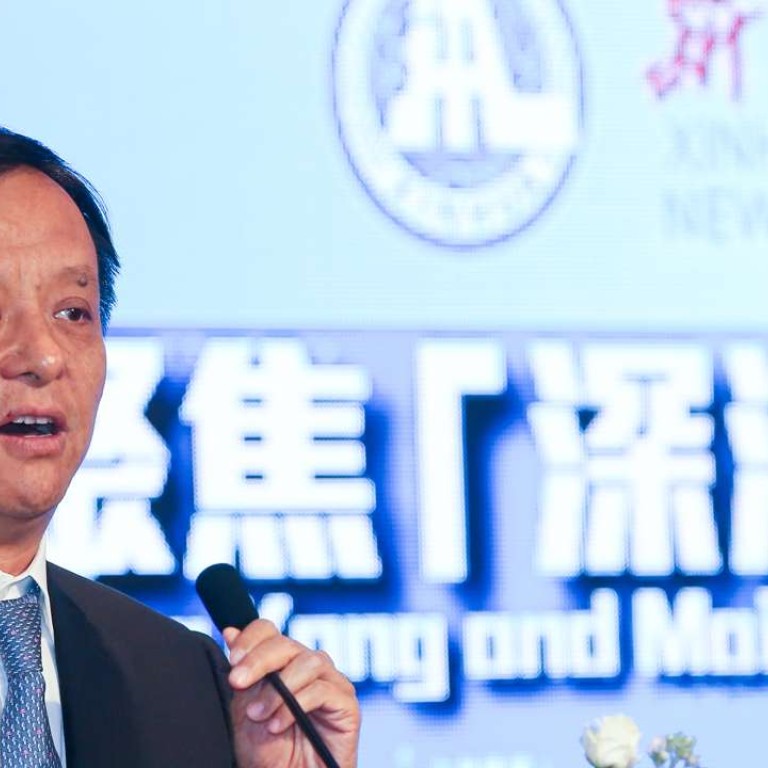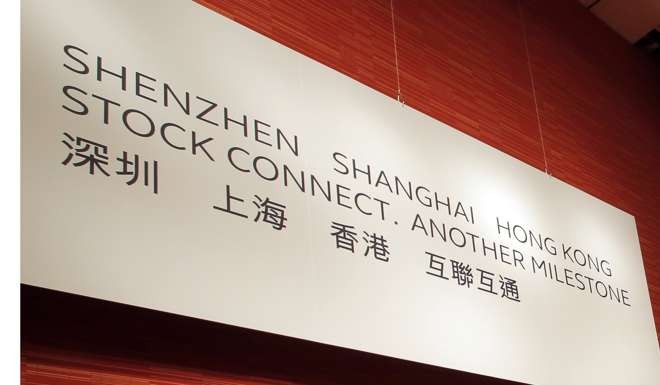
‘We need more international listed companies’, HKEX’s Li tells stock connect forum
Exchange chief says stock exchanges and brokers in Hong Kong and Shenzhen are ready for the launch of the new cross-border trading scheme
Hong Kong Exchanges and Clearing (HKEX) is working flat out to attract more international firms, especially so-called new-economy companies, to list in the city to enhance the competitiveness of the local market, according to chief executive Charles Li Xiaojia.
“Over 60 per cent of listed companies on the Hong Kong stock market are mainland firms. Mainland investors clearly like to invest in our stocks but they would like to invest in more international stocks too, which are not available in the mainland,” Li told a packed public forum on the soon-to-be launched Shenzhen-Hong Kong Stock Connect share trading link, on Thursday.
“If we also want to attract more mainland investors into the Hong Kong stock market via the stock connect scheme between Hong Kong and Shanghai, we need to offer more international stocks for them to buy and attract more international firms or exchange traded funds to list here.”
The Shanghai-Hong Kong Stock Connect was launched in November 2014 so international investors could buy A-shares in Shanghai via Hong Kong stock brokers, while mainlanders can invest in Hong Kong stocks via mainland brokers, under a daily quota.
All we need now is the starting gun [for the Shenzhen-Hong Kong Stock Connect], but that’s not in my hands
The new link between Shenzhen and Hong Kong stock markets was approved by the State Council in August, but Beijing is yet to announce a launch date, although Li did reveal last month the new scheme would be launched on a Monday after mid November, which suggests November 21 or 28.
“The stock exchanges and brokers in Hong Kong and Shenzhen have all prepared well for the launch of the new cross-border trading scheme. All we need now is the starting gun, but that’s not in my hands,” said Li, indicating all parties concerned are waiting for the green light from Beijing.
Li told the forum that the new connect scheme would likely operate for at least a decade, and by then he expected the mainland to have fully opened up its capital markets to the world.

China still has capital controls in place so international investors can only rely on schemes such as the stock connects to invest in the mainland, with mainlanders using the channel to invest overseas.
Some commentators believe the connect schemes will effectively become irrelevant when capital controls are removed.
“Very sophisticated international and mainland investors may not use the connect scheme after China fully opens up. But it will remain appealing to general investors as it is an easy and transparent way of conducting cross-border trading easily,” he said.
“After the Shenzhen-Hong Kong connect, we will then explore other type of schemes for bonds, metals and IPOs,” he added.
London Stock Exchange is also looking at a connect scheme with Shanghai Stock Exchange, but Li played down the threat to Hong Kong.
“Hong Kong and mainland stock markets are trading in the same time zone. London and mainland China open at different times,” he said.
Hong Kong’s chief executive Leung Chun-Ying attended the same forum, and said the cross-border trading scheme is important for capital flow between the mainland and Hong Kong.
“The stock connect between Hong Kong and Shenzhen will be another important milestone to tie up the Hong Kong and mainland capital markets,” Leung said.
While underlining that HKEX is looking at all possibilities to try and attract new-economy companies to list here, Li said nothing on whether he planned to relaunch a consultation into offering a dual-listing share structure in Hong Kong.
HKEX proposed last year allowing companies such as Alibaba, Facebook or Google to also list in Hong Kong, but the Securities and Futures Commission opposed the proposals because of a lack of investor protection measures. Alibaba owns the South China Morning Post.

A listing reform consultation process, launched in mid-June by the SFC and HKEX and due to end on November 18, is looking into new listing approval policies.
The reform proposes the creation of two new committees, a listing policy committee and a listing regulatory committee, on top of the existing listing committee. The committees would have equal representation by the SFC and the HKEX, and have the authority to approve complicated listings and to set listing policies
Alibaba founder Jack Ma Yun said last week that Hong Kong’s listing regime was outdated and needed reform if it hopes to attract e-commerce firms to list here.
Li thanked Ma for his recommendations, adding that HKEX will study all possible reforms that could help attract more types of company to list here.
As to events in the United States over the last 24 hours, Li said he was surprised by Donald Trump’s victory in the US presidential election.
“But the US has this election every four years and markets around the world will respond to the news accordingly. I do not believe there would be negative impact to the market for the long term.”

